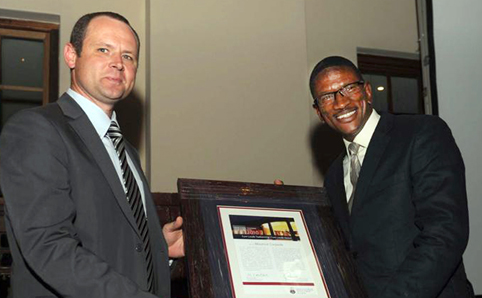|

|
|
Kovsie Cum Laude winner Maurice Carpede shows his award. With him is Naude de Klerk(left), Kovsie Alumni Chairperson.
Photo: Foto 24
|
Dr John Purchase, Chief Executive of the Agricultural Chamber of Commerce, was honoured as Kovsie Alumnus of the Year by the University of the Free State (UFS) during the annual Kovsie Alumni Awards Dinner on 2 September 2011. Dr Purchase and four other former Kovsies were honoured for exceptional achievements and contributions made to the UFS at this glittering event.
The well-known columnist Mr Willem Theron who writes columns for Beeld and Volksblad, was honoured with the Kovsie Ambassador Award. Another well-known Kovsie, the radio and television personality Mr Maurice Carpede was honoured with the Kovsie Cum Laude Award. Carpede shares this award with Mr Koert Pretorius, Chief Executive of Mediclinic South Africa, they received the award jointly. Mr Arie van der Bijl, retired Financial Director of the UFS, was honoured with the Alumnus Award for exceptional service delivered to the UFS.
Dr Purchase, who was unable to attend the award ceremony, expressed his appreciation in a pre-recorded message. He said that Kovsies taught him how to be a leader. Theron, a marketer for the Kovsie Alumni Trust who received the Centenary Medal from the UFS in 2004, said in his acknowledgement speech that he feels humbled by this award. He said Kovsies became both his home and his family.
Both Carpede and Pretorius mentioned the impact Kovsies had on their lives. Carpede said he became a Kovsie in the years of transition, a time when words like “whites only” were printed on some doors, but despite all of that, he learnt that not all whites were bad. Pretorius, who was honoured for his contribution to private healthcare in the country, said that Kovsies were the key that unlocked several doors for him.